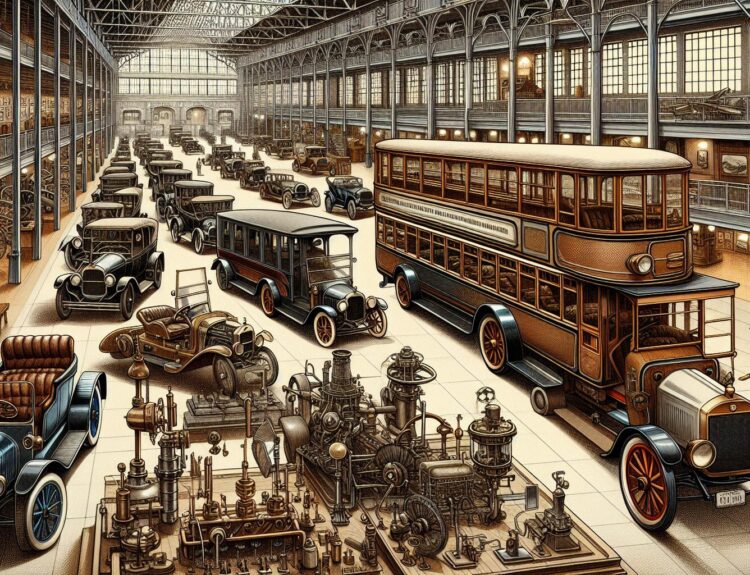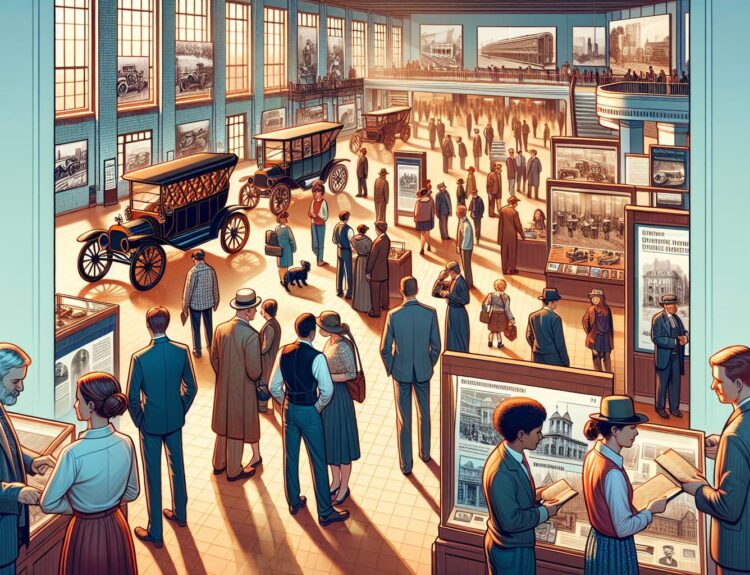Detroit’s always had a knack for churning out some pretty remarkable folks. It’s like the city’s got a magic touch, transforming ordinary people into icons that leave their mark on the world. From music legends that changed the tunes we jam to, to trailblazing entrepreneurs who reshaped industries, Detroit’s given us more than just cars and Motown.
Growing up in the Motor City, I’ve always been surrounded by stories of individuals who made it big, inspiring me and countless others. It’s not just about their fame, but the grit and spirit they embody – qualities that seem to be in Detroit’s water. Let’s dive into the lives of some of these famous personalities and find out what makes them so special. Trust me, their stories are nothing short of inspiring.
Motown Legends
Growing up in Detroit, one can’t help but be immersed in the rich musical heritage that’s as much a part of the city as its automotive industry. It’s a history steeped in the soulful sounds of Motown Records, a label that didn’t just produce music; it created legends. When I think of Motown, icons like Stevie Wonder, The Supremes, Marvin Gaye, and The Temptations immediately come to mind. Their melodies were the soundtrack of not only Detroit but the entire world throughout the 60s and 70s, a testament to their timeless appeal.
Founded in 1959 by Berry Gordy, Motown Records carved a niche for itself as a powerhouse of talent, churning out hit after hit that transcended racial barriers and united listeners. It’s awe-inspiring to consider how a small recording studio, Hitsville USA, became the birthplace of such an influential movement in music history. The contribution of Motown to the evolution of music is unparalleled, fostering a style that blends rhythm and blues with pop sensibilities and sophisticated songwriting.
One can’t discuss Motown without highlighting the remarkable talent of Stevie Wonder. Signing with Motown at the tender age of 11, Stevie’s prodigious talent shone brightly, leading to an incredibly successful career that spanned genres and generations. His songs didn’t just capture the essence of Motown; they pushed the boundaries of music, weaving complex social issues into catchy melodies that remain relevant today.
Similarly, The Supremes, led by Diana Ross, shattered records and broke down barriers for female groups in the music industry. Their polished performances and elegant style made them household names, setting the stage for future generations of women in music. It’s hard to overstate their influence, both musically and culturally, as they paved the way for artists to come.
The impact of Motown extends beyond the artists to the talented team of songwriters and producers behind the scenes. Names like Smokey Robinson, the Holland-Dozier-Holland writing team, and others contributed to a catalog of music that is both groundbreaking and eternally fresh. Their ability to craft hits that resonate across decades is nothing short of remarkable.
Automotive Innovators
When I delve into Detroit’s history, I can’t help but marvel at its reputation as the Motor City. This moniker isn’t just a catchy name; it’s a testament to the city’s pivotal role in the automotive industry. Detroit has been home to some of the most groundbreaking innovators whose contributions have not just shaped the industry but have had a lasting impact worldwide.
Let’s start with Henry Ford, a name synonymous with automotive innovation. Ford didn’t invent the automobile, but what he did was arguably more significant: he revolutionized the way cars were made. By introducing the assembly line to automobile manufacturing, he didn’t just make production more efficient; he made cars affordable for the average American. This wasn’t just a technical achievement; it was a cultural revolution. Suddenly, the idea of personal transportation wasn’t a far-off dream; it was an attainable reality for many.
Another towering figure in Detroit’s automotive landscape is William C. Durant. As the founder of General Motors, Durant was a visionary in his own right, believing in a company that offered a variety of automotive brands to cater to different needs and financial capabilities. His concept of a multi-brand conglomerate was revolutionary at the time and remains a fundamental practice in the automotive industry today.
Detroit’s impact on automotive innovation didn’t stop with these early pioneers. The city has continued to be a hub for automotive engineering and design, hosting talents that push the boundaries of technology and sustainability. In the recent decade, Detroit has been at the forefront of the electric vehicle (EV) movement, with companies like GM committing to an all-electric future. This marks an exciting new chapter in Detroit’s automotive story, proving that innovation is not just part of the city’s history but its present and future.
Henry Ford’s and William C. Durant’s legacies are felt not just in Detroit but globally, as their pioneering work laid the foundation for the modern automotive industry. Their vision and innovation paved the way for a world where personal mobility is accessible to most. As I continue to explore the rich tapestry of Detroit’s history, it’s clear that the city’s contributions to the automotive world are as enduring and impactful as the vehicles that roll off its assembly lines.
Literary Figures
When thinking about Detroit, cars and music might be the first things that come to mind. But did you know that Detroit has also given birth to some of the most influential voices in American literature? It’s true; the city has a rich literary history that often goes unnoticed. From poets to novelists, Detroit’s contribution to the literary world is both vast and significant.
One such figure is Jeffrey Eugenides, born in Detroit in 1960. He’s best known for his novel “Middlesex,” which won the Pulitzer Prize for Fiction in 2003. The multigenerational saga that explores themes of identity and transformation is partially set in Detroit. Eugenides’s vivid portrayal of the city throughout the 20th century highlights the ever-changing landscape of Detroit, alongside the shifting dynamics of an American family. His work not only brings to light Detroit’s complexities but also celebrates its diversity and resilience.
Another key figure is Philip Levine, a poet whose work often reflects his early experiences in Detroit’s industrial landscape. Born in 1928, Levine worked in auto manufacturing plants during his youth, an experience that deeply influenced his poetry. His collection “What Work Is” magnificently captures the essence of working-class life in post-war America, focusing particularly on the city of Detroit. Levine’s ability to transform the mundane into profound observations on labor, dignity, and social justice earned him a Pulitzer Prize in 1995.
Dudley Randall is another Detroit literary icon who can’t be overlooked. As the founder of Broadside Press in 1965, Randall played a pivotal role in the Black Arts Movement, promoting African-American literature and poetry. His poem “The Ballad of Birmingham,” written in response to the 1963 bombing of an African American church in Birmingham, Alabama, remains a powerful commentary on racial violence. Randall’s work not only reflects the turbulent times of the Civil Rights Movement but also showcases the strength and resilience of the African American community in Detroit.
These figures are just the tip of the iceberg when it comes to Detroit’s literary influence. The city’s vibrant cultural scene and tumultuous history have provided a fertile ground for stories that resonate with themes of resilience, transformation, and identity. Detroit’s literary sons and daughters have gone on to shape not just the local narrative but also the broader contours of American literature. Their works serve as a testament to the city’s enduring spirit and its capacity to foster talent that speaks to universal human experiences.
Civil Rights Activists
While Detroit is renowned for its contributions to the automotive industry and music, it’s also birthed several key figures in the civil rights movement. These individuals have not only changed the landscape of Detroit but have also left an indelible mark on the struggle for equality across the United States.
One of the most iconic figures is Rosa Parks, known as the “mother of the civil rights movement.” While she’s universally celebrated for her pivotal role in the Montgomery Bus Boycott, many people don’t know that Detroit was her home for much of her life after the boycott. Here, she continued her advocacy, working alongside Congressman John Conyers and influencing the city’s approach to civil rights.
Another trailblazer from Detroit is Malcolm X. Despite being born in Omaha, Nebraska, Detroit played a crucial role in his early formation as a civil rights leader. His time in the city exposed him to the harsh realities of racial segregation and economic disparity, shaping his approach to civil rights. Malcolm X’s fiery rhetoric and insistence on black self-sufficiency and defense against racial violence inspired many to join the struggle for justice.
Detroit’s influence on the civil rights movement isn’t limited to these famous names. The city has been a hotbed for activism and the fight for equality. Figures like Betty Shabazz, an educator and civil rights advocate, also call Detroit home. Her work, particularly in promoting the legacy of her husband, Malcolm X, and her contributions to education and activism, have left a lasting legacy within the community.
The city’s history is rich with stories of resilience and fight, from grassroots organizing to shaping national civil rights legislation. Detroit’s activists have played a significant role in challenging systemic racism and advocating for civil rights, embodying the spirit of resistance and transformation that defines the city.
The narrative of Detroit’s contribution to civil rights is ongoing, with new leaders emerging from the city’s vibrant communities. These individuals continue the work of past activists, advocating for social justice, equality, and change, both locally and nationally. Detroit remains a symbol of the enduring struggle for civil rights, a testament to the city’s resilience and its people’s commitment to justice.
Conclusion
Detroit’s story is a powerful testament to the spirit of activism and resilience. From Rosa Parks to Malcolm X, the city has been a cradle for leaders who’ve shaped our nation’s pursuit of equality. It’s been inspiring to see how Detroit’s legacy of civil rights has evolved, with new voices emerging to continue the fight. As we look back at these iconic figures, it’s clear that their impact goes beyond the city’s borders, influencing generations across the globe. I’m left with a deep appreciation for Detroit’s contribution to our collective history and a hopeful outlook for its future in social justice.




